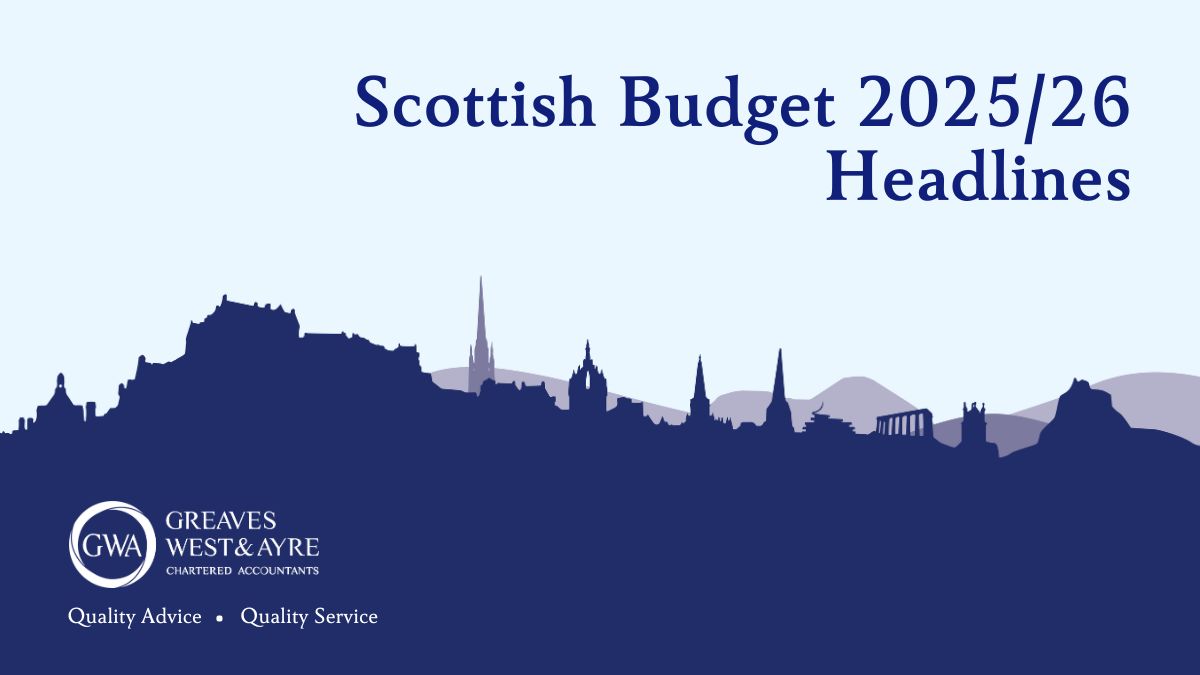Scottish Budget 2025/26 – Highlights

Information as of 4 December 2024
Shona Robison delivered her second Scottish Budget as Finance Secretary yesterday, 4 December 2024. Given the changes announced in the UK Budget in late October 2024, it has been decided not to amend any of the Income Tax rates that apply to Scottish resident taxpayers. The Income Tax bands for the starter rate and the basis rate will increase by 3.5%, nearly twice the current rate of inflation.
With regard to Land and Buildings Transaction Tax (LBTT), the rate of the Additional Dwelling Supplement (ADS) has been increased (with effect from 5 December 2024 unless Missives have been signed prior to this date). A consultation on the operation of LBTT was also announced, which will commence in 2025. No other changes to LBTT were announced with all rates and bands (other than the ADS change) remaining the same.
Scottish Landfill Tax rates will increase from 1 April 2025 by significantly more than inflation.
We have highlighted the points we believe are most relevant for our clients below. Should you want to read the full Budget Report it can be found on the Scottish Government’s website – https://www.gov.scot/publications/scottish-budget-2025-2026/
Personal Taxes
Scottish Income Tax
As noted above, the main announcement in relation to Scottish Income Tax rates and bands are the increases to the starting rate band and the basic rate band. The new bands are shown in the table below.
The Scottish Income Tax bands and rates for 2025/26 are summarised in the table below
| Band | Income range (from / to) | Rate | Change from 2024/25 | |
| Starter rate | £12,571 | £15,397 | 19% | +£521 |
| Basic rate | £15,398 | £27,491 | 20% | +£409 |
| Intermediate rate | £27,492 | £43,662 | 21% | -£930 |
| Higher rate | £43,663 | £75,000 | 42% | Nil |
| Advanced rate* | £75,001 | £125,140 | 45% | Nil |
| Top rate | £125,141 | 48% | Nil | |
* assumes individuals are in receipt of the standard UK personal allowance. The personal allowance is reduced where an individual’s taxable income exceeds £100,000.
It was also announced that no new bands nor any increases in the rates of Scottish Income Tax will be introduced in this Parliament. The next Scottish parliamentary election is expected to be held in May 2026.
Because Chancellor, Rachel Reeves has frozen those thresholds in the rest of the UK, it means Scottish residents earning less than £30,300 will pay less tax than if they lived in England or Wales. The difference is less than £30 per year.
It is important to note that only certain types of income are liable to the Scottish rate of Income Tax. It does not, for example, apply to interest and dividend income. For business owners, taking dividends may, once again, become more preferable to taking a salary. For those who are self-employed, or who operate through a partnership, it may be an opportune time to review your business structure.
Land and Buildings Transaction Tax (LBTT)
From 5 December 2024, the rate of ADS will be 8% (increased from 6%). Where legal Missives have been signed on or before 4 December 2024 but the transaction has not completed, the old rates will apply.
All other LBTT rates and bands are unaffected.
The Scottish Government will also launch a review of LBTT in the Spring of 2025 to ensure that the policy intent continues to be met. This will look at the rules for residential and non-residential transactions, which can differ materially from the rules in England and Northern Ireland. (Wales has its own devolved Land Transaction Tax.)
Non-domestic Rates (business rates) – 2025/26
The Basic Property Rate of Non-Domestic Rates will be frozen at its current level of 49.8p. The Intermediate Property Rate and the Higher Property Rate are to increase by inflation (to 55.4p and 56.8p respectively).
The 100% relief for the hospitality sector in island communities is maintained, capped at £110,000 per business.
A 40% relief will apply for hospitality premises liable for the Basic Property Rate (with a rateable value to and including £51,000) capped at £110,000 per business.
Scottish Landfill Tax
From 1 April 2025, this will be increased to match rates in England. The two rates will be:
- Standard rate of £126.15 per tonne (up from £103.70);
- Lower rate of £4.05 per tonne (up from £3.30).
Other Scottish Budget Highlights –
Robison also announced plans to end the two-child benefit cap in Scotland from 2026. She will work on ways to mitigate this and confirmed the detailed work will start with this Budget but is dependent on the UK Government providing some required information.
Local Government sets Council Tax and no announcements were made in the Budget.
It was confirmed that the Scottish Government intends to introduce a Scottish Aggregates levy from 1 April 2026.
The Air Departure Tax continues to remain a thorny issue, particularly with regard to the Highlands and Islands. For now, the UK wide rates continue to apply.
The Scottish Government mentioned in their Budget that new taxes are being considered, including a Building Safety Levy and a Cruise Ship Levy.
As always, the information outlined above is for general guidance purposes only. We appreciate that every individual and business has different circumstances and you should always seek appropriate professional advice before you act on any of the information provided.
If you would like more information or advice on the Budget or require wider business planning or financial guidance, please do get in touch with your GWA Partner. Alternatively, if you are not a GWA client please do contact us to arrange a free initial meeting.


